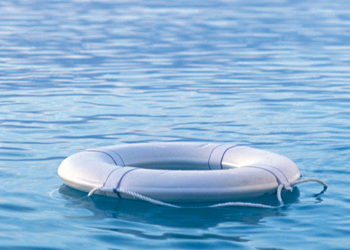My father’s brand of parenting was both efficient and effective. With five children, perhaps he lacked the time to coddle, or more likely, his military bearing precluded the impulse. I learned to ride a bike by careening downhill in the backyard, honing my steering by avoiding pine trees as they rushed by in a blur. He had imparted the facts at the top of the hill, pertinent information about pedaling, braking, and keeping your eyes up. Gravity and physics are master professors.
All three of my older sisters became ace softball players, singular in their ability to field, unafraid of pop-up ground balls. They’d lived through hours of practice in the hot Florida sun, my father beaming fast-pitch into their thin leather gloves until their palms stung. Loss of focus or flinching could mean a bobbled catch, a ball-sized bruise beneath their floral tank tops and directions to Walk It Off. It was softball as self defense.
My younger brother learned to swim before he turned two. A pool in our backyard and a toddler with stealthy escape skills drove my mother crazy with worry. So she sat chain smoking by the pool while my father hired an avant-garde teacher to toss her youngest into the deep end, his blue eyes wide under the water as he blew bubbles and paddled to safety.
We learned independence early. When it came time to pick a career path or a college, there were no fancy weekend tours, guidance counselor sessions, or laboring over applications and essays. The process was more of a self-directed cursory decision, driven by the calendar and necessity. No water wings, no kiddie pool–just sink or swim.
Faced with these polar options, we gained fortitude and an admirable proficiency at faking confidence even when–especially when–we felt it least. Once when one of my sisters was about 10, my father decided it was time for her to learn to water ski. We took the boat out on a less populated Florida lake and in she went, skinny arms held straight out in front of her and her knobby knees slightly bent atop skis that felt awkward and too large for her thin frame. With the motor idling, you could hear the deep croaking of the alligators on the bank calling to each other. Of course there were gators. Every body of water in Florida contains gators. You’ve never seen a faster study on water skis than my sister. She got up and stayed up, at least until he had to stop to refuel. As we slowed, she sank, her eyes growing wider as the dark lake water swallowed her whole. I have never doubted Jesus’ miracle of walking on water. I witnessed it first hand as my sister made it to the boat in record time.
We all learned to become high-achievers. When the alternative to failure is becoming reptilian lunch, the non-lunch option is popular. Some of us are just wired this way, call it Type A or chalk it up to perfectionism. The stakes stay high. It’s like living life in the middle of the James Bond car chase scene at all times–motivating, exciting, and intense, but exhausting. Every little letdown becomes a crisis with personal implications. Imagine: your car breaks down and heads will roll because someone somewhere should have seen this coming. Your toddler has a melt down and the entire grocery store must be judging your moral disgrace. You get a “B” in a class and all you see are the 10 ways you should have studied harder. In sink-or-swim living, there’s no room for error, no patience for sub-par.
Keeping the snarling dog of failure at bay means having to be constantly alert. Because life is black and white, options get reduced to an either/or: sink or swim. Stepping out with something new, a change in the landscape, sends primal signals to the survival center: fight or flight. Because the universe has a sense of humor, all the good things come with risk of failure and the most messiness–relationships, creativity, opportunity. When you’ve been conditioned to avoid failing, you do one of two things: (1) dodge the risk altogether and don’t try (stay safe), or (2) do try and stay in a perpetual state of freaking out when things go awry (stay in crisis). Both are unacceptable and frankly more than a little whack.
A provocative book called Nurture Shock discusses the outcomes of different ways to praise children. One group was told they were smart; the other, that they were hard workers. Hard work is something they could control; being smart is evidence of something out of their control. After being given increasingly difficult puzzles to solve, the “smart” group gave up earlier. They stopped trying. Failure to solve the puzzle would mean they were no longer smart. The “hard workers” never stopped trying. Failure didn’t diminish their identity; it was something they knew they could work through, and even learn from, given enough time.
It’s taken some reprogramming, but thankfully I’ve learned life rarely operates in black and white. In between sink or swim is a whole other option. Ironically, the infant swim teacher taught us this, too. We can float. Floating involves no freaking out, no shortness of breath or raging at onlookers. Turns out it’s mostly peaceful and we get a great view of the sky while we’re at it. Unless we’re fleeing the alligators, which, let’s be honest, are mostly creatures of our trumped up imaginations, floating allows us space to trust ourselves, the universe, and other people for help. The water itself–the very thing we were struggling against or afraid to jump into–becomes a source of buoyancy, bearing us along with the tide.
Struggle and failure hold gifts of wisdom and character that can be received no other way. When we give ourselves and our children the freedom to fail, we sprinkle grace into our lives. We learn to sit in the mess and take stock with reasonable objectivity, picking out the good parts and tossing aside the rest. Best of all, we learn to link hands with other failures–otherwise known as humanity–until forgiveness, humility, and grace become second nature. We lie back with arms outstretched, fill our lungs with a long, slow breath, and float.









How do you always know what I need to hear?! I recently discovered that I start getting bored at work when the sense of being overwhelmed stops. It’s like I can’t “be still and know”. Thanks for the reminder of how good the gray area can feel!